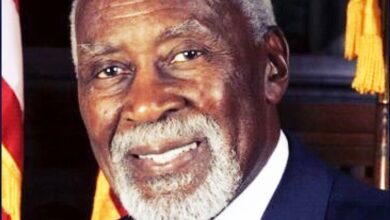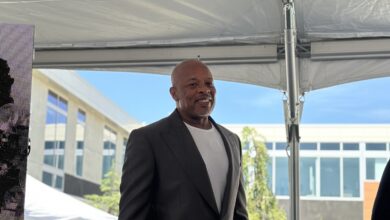Reimagining Justice: Q&A with Judge Songhai Armstead

10.30.2023 — LISC Stories

For decades, the United States has disproportionately incarcerated millions of people of color and people living in poverty. Nationally, Latinos are incarcerated at almost three times the rate of whites, and Black Americans are incarcerated at over five times the rate of white Americans, which underscores the urgency of investing in diversion programs to address systemic inequities.
The ripple effects of incarceration extend far beyond the person who is imprisoned. Even short stays in jail can deeply impact a person’s life, including their ability to keep their housing and employment. These consequences can also impact the life outcomes of their children, family, and community. That is why care-centered diversion efforts and community involvement are critical for building thriving communities of opportunity and choice.
Since 2021, LISC LA and the LISC Safety & Justice team have served as key partners in LA County’s efforts to reimagine the justice system. LISC LA has been proud to serve as an intermediary and capacity builder in the County’s efforts to prevent individuals from entering the justice system and supporting those returning from custody to build successful lives.
LISC Safety & Justice empowers locally led coalitions to collectively address crime, fear of crime, and over-policing in their communities. Through a core place-based model, the program supports community leaders, residents, and other stakeholders to design and implement strategies that create healthier and safer environments, reduce and prevent violence, promote alternatives to arrest and incarceration, and support people re-entering communities after incarceration.
The Justice, Care and Opportunities Department (JCOD) is LA County’s new central agency unifying the County’s efforts to serve vulnerable justice-involved individuals and communities. We connected with Judge Songhai Armstead, Director of JCOD, who shared with us the department’s initiatives and programs, her approach to criminal justice reform, and the role of partnerships in these efforts.
What new programs or initiatives are being deployed by JCOD in support of justice-impacted communities?
There’s so many! One of the things the department has done recently is launch a 7-day a week Justice Connect Support Center that takes calls from justice-involved individuals, their families, and the community to facilitate pretrial court hearing reminders, follow-up with clients released pretrial by the Court, conduct warm handoffs to providers and coordinate linkages for urgent needs, including on-demand transportation assistance to housing, court appearances, probation/parole, and childcare necessary for court appearances, and to capture data to assess services needed. For those people who are trying to figure out, how do I get help? How do I get support? How do I get to court? They can now call 1 (833) LAC-JCOD or (833) 522-5263 and visit the website, www.justiceconnect.org, to learn more about how JCOD can help, including connecting individuals with the JCOD Justice Connect Support Center, important steps to make court appearances, information about the pretrial process, how to navigate to care management providers for those in need of supportive services, and answers to frequently asked questions. Many people don’t go to court or miss court appearances because they don’t understand the implications of missing a court hearing or their family members don’t know how to support individuals attempting to navigate the system. JCOD is designed to help people navigate and connect to resources as they move through the criminal justice system. One way that is done is through the department’s programs, such as the Rapid Diversion Program that provides court-ordered diversion for those struggling with mental health or substance disorders. Upon successful completion of the program criminal charges can be dismissed.
How is JCOD building the capacity of community-based organizations interested in this work?
One way JCOD is building capacity is through the administration of the County’s Care First Community Investment (CFCI) initiative, which is a commitment to provide an annual allocation of 10% of the County’s locally generated unrestricted revenue (net County Cost) to alternatives to incarceration and direct community investment. This work began with the advocacy efforts of the organizations, individuals, and Los Angeles County voters that supported the Measure J ballot initiative. JCOD’s work is led in collaboration with County departments and community representatives that serve on the CFCI Advisory Committee. The CFCI Advisory Committee makes recommendations about funding to support those priorities through County departments and a third-party administrator that provides grant funding to nonprofits, community- and faith-based organizations. In the first three years, the County has allocated over $288 million of County funds and an additional $87.7 million in federal funds to support these programs. With its partners, JCOD just launched the application for the third round of grants for nonprofits and community-based or faith-based organizations interested in this work.
Throughout my career, I have learned that there is no one-size-fits-all justice system. We must design a justice system that looks at a person in a humanistic, whole way.
How have your personal experiences informed your approach to criminal justice reform?
It has everything to do with the way I look at the justice system. My professional career started in the space around psychology and working with individuals struggling with substance use disorders and expanded to the legal world. Throughout my career, I have learned that there is no one-size-fits-all justice system. We must design a justice system that looks at a person in a humanistic, whole way. We must ask ourselves, “who is this individual in front of us, and what’s the best outcome for the community and this person.” Retiring from the bench during the pandemic inspired me to help create a system that I wish I had access to as a judge. Everyone is presumed innocent and entitled to their day in court. For those who want it and need it, the goal is to provide a network of supportive services that will lead to successful outcomes for individuals and their communities.
Can you discuss the partnerships that are driving forward JCOD’s “care first” approach?
JCOD works collaboratively with its fellow County departments, third-party administrators, and community-based partners to accomplish the goals set by the Board of Supervisors. LISC, as one of JCOD’s current third-party administrators, has been a fantastic partner over the last two years. We’ve had 89 organizations in four cohorts participate in the Incubation Academy, aimed at building the capacity of organizations, helping them secure funding, and become more competitive to secure government contracts. We also partner with the LA County Department of Mental Health to increase the number of beds and services for individuals with serious mental illness that are being released from custody by providing funding for housing paired with wraparound services for the full-service partnership program. Additionally, through the Rapid Diversion Program, JCOD works with the Public Defender, Alternate Public Defender, District Attorney, City Attorney/Prosecutors’, Department of Mental Health, and community-based provider organizations (i.e., Project 180 and Exodus) through agreements with LISC to offer diversion. This program is currently offered in seven court locations and collects data to study impact and effectiveness of the program. Since program launch, close to 1,800 people have been granted diversion. The County would not have been able to stand up these initiatives as quickly as it did without the support of its partnerships.
To learn more about JCOD, visit https://jcod.lacounty.gov/.




